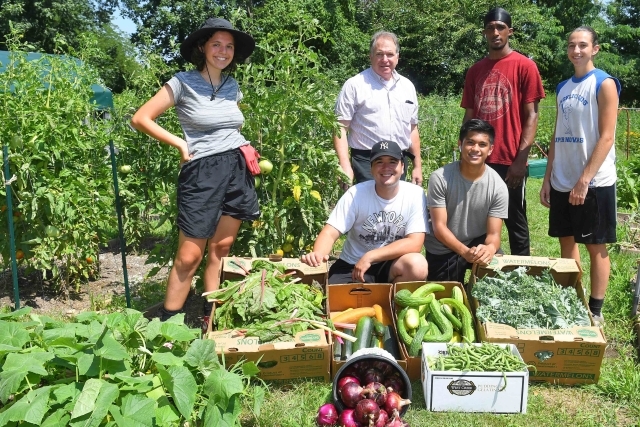
Each year on April 22, the world celebrates Earth Day. This global event, now in its 50th year, was created to spark awareness of rampant pollution and call for robust solutions to save the planet for future generations.
Founded by Gaylord Nelson, an environmentalist from Wisconsin who served as a US senator and governor, Earth Day launched a new and powerful wave of environmental activism that led to the passage of landmark legislation, such as the Clean Air Act, Clean Water Act, the Endangered Species Act, and the formation of the US Environmental Protection Agency.
It is now recognized as the world’s largest civic event, annually drawing participation from millions of individuals in more than 190 countries.
In 1970, St. John’s University joined thousands of colleges, universities, primary, and secondary schools to observe the inaugural Earth Day. St. John’s students launched the event with a march on the Queens, NY, campus, followed by other activities.
The University’s initial efforts mushroomed over the next half-century into a thriving, large-scale sustainability operation.
“Earth Day 2020 provides an opportunity to acknowledge the environmental urgency and think about building a roadmap to achieve a more just and sustainable planet,” said Thomas M. Goldsmith, Director, Environmental and Energy Conservation, Department of Campus Facilities and Services. “Pope Francis’s encyclical letter on the care of our environment is written with hope and resolve, and helps the St. John’s community understand the gift of creation.”
Mr. Goldsmith was referring to the pope’s 2015 encyclical on ecology, Laudato Si’: On Care for Our Common Home, in which he wrote that climate change is real, and human activity and fossil-fuel burning are major causes of global warming. Pope Francis concluded in his teaching document that a radical change in human behavior is needed in order to reverse the damage already done and to help prevent the most vulnerable from intense suffering due to the massive degradation of the environment.
The University has a number of ongoing sustainability initiatives:
Climate Action Plan
St. John’s is expected to achieve a 50 percent carbon emissions reduction from energy consumed by buildings by 2030. St. John’s is developing plans to meet that limit and include renewable energy sources, such as geothermal and solar power.
Student Involvement
The Office of Sustainability partners with Residence Life to engage students in their residence halls to live more sustainably through recycling enhancements and energy conservation. Events include an Energy Reduction Tournament, Move-out Food and Clothing Collection, Campus Sustainability Day, and campaigns for awareness and involvement.
Municipal Solid Waste and Recycling
Recycling and food waste reduction efforts are ongoing at St. John’s and include implementation of single-stream recycling, enhancements to bins and signage, and food waste recovery.
Student Sustainability Coordinators
Since 2008, St. John’s has maintained a team of student workers as Sustainability Coordinators, who perform a variety of tasks, from policing campus-wide recycling of municipal solid waste to running campaigns for student involvement in energy conservation. These workers perform a daily collection of food waste to generate on-site composting, as well as maintain the organic garden and run numerous special events.
Tree Campus USA Program
St. John’s received Tree Campus USA participation awards for the past seven years. The Queens campus has more than 3,000 trees, 500 of which came from the MillionTrees NYC project (2008–11). Each year, the University’s Campus Tree Mapping Project grows with the help of students, who are guided by Paula Kay Lazrus, Ph.D., Associate Professor, Institute for Core Studies. Currently there are 789 mapped trees.
Student Community Garden
Student workers and the Student Earth Club built and now tend this organic vegetable garden consisting of more than 50 semiraised planting beds with organic soils, automatic irrigation, and a central drainage system. Students harvest and deliver the vegetables to help support St. John’s Bread & Life in Brooklyn, NY. More than 1,000 pounds of vegetables are annually harvested.
On-Site Food Waste Compost System
St. John’s began composting food waste in 2009. In 2011, through the Office of Sustainability, student workers built a large-scale, aerated static pile (ASP), three-bin, composting facility. During academic semesters, student workers pick up almost 1,000 pounds of food waste from five campus kitchens and process it through a pulper machine. Annually, St. John’s recovers approximately 42 tons of food waste and paper napkins for composting.
The University also participates in the Sustainability Tracking, Assessment & Rating System™ (STARS); food recovery efforts to help alleviate hunger locally; and is a charter participant in the US Environmental Protection Agency’s Food Recovery Challenge FRC program,
St. John’s remains firm in its long-term commitment to enacting measures that will ensure sustainability for generations to come. Earth Day annually reminds us that the environment is not limitless, and it is the responsibility of all humans to serve as stewards of the planet and nurture it with respect.
Related News
Former FTC Chair Engages with Students at St. John’s Henry George Lecture
The youngest-ever Chair of the Federal Trade Commission (FTC) brought her economic wisdom and public policy experience to St. John’s University on February 5, speaking to a gathering of students...
Q&A with Brenda Almendarez-De Bello ’06M.S.Ed., ’19Ed.D., LEAD Honoree
Brenda Almendarez-De Bello ’06M.S.Ed., ’19Ed.D., Principal of Tamarac Elementary School in the Sachem Central School District , will be among several alumni honored by The School of Education (SOE) at...
Archbishop Hicks Attends St. John’s University Men’s Basketball Game at Madison Square Garden
St. John’s University proudly welcomed the Most Reverend Archbishop Ronald A. Hicks to Madison Square Garden on Monday, February 9, 2026, as he attended the Red Storm Men’s Basketball game in a show of support for the University community, its student-athletes, and its Catholic and Vincentian mission.
